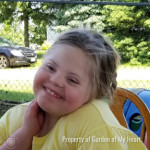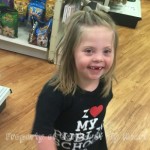Take a look at this picture:
This is a little girl. This is a toddler.
Here’s another:
This is a little girl who has Down syndrome.
And here’s another:
This is not “a Downs,” “Downs,” or “a Downs girl.”
There are a lot of things you can call Rowenna: happy, curious, beautiful, funny, clever. But there are a lot of things that aren’t appropriate: Downs, a Downs, a Downs girl. (for starters)
Maybe this seems silly to you or inconsequential but have enough people say to you “Oh, you know those Downs kids” or “All Downs babies…” and it wears you down. You want to hear that person’s name (yes, why can’t it just be “I know a little guy named Ben” instead of “I know a Downs baby”?), you want to hear the cool stuff about them. The diagnosis doesn’t mean much in the scheme of things. And honestly, I’ve stopped caring that people think I’m nit-picking when I ask for People First language.
Rowenna is more than her diagnosis and when you call her “a Downs” that says a lot about what you think of her. (hint: not very much) I’m looking at you especially, health care professionals and special ed teachers. People who should know better. People who need to know better. People who deal with families at painful, vulnerable times and make things infinitely worse by not bothering to acknowledge the child but only the diagnosis.
It’s pretty simple. Refer to the person first, and add the diagnosis if necessary. Person with Down syndrome. Girl with autism. Man with diabetes. Apply the Golden Rule here and it becomes quite clear why this is important. Do you want to be called obese man? Nearsighted woman? Cancer teenager? No, I don’t think so.
So stop calling my kid “a Downs,” “Downs,” or “a Downs girl.”
Language matters.










9 Responses to It Matters